Rómulo Betancourt on:
[Wikipedia]
[Google]
[Amazon]
Rómulo Ernesto Betancourt Bello (22 February 1908 – 28 September 1981; ), known as "The Father of Venezuelan Democracy", was the president of Venezuela, serving from 1945 to 1948 and again from 1959 to 1964, as well as leader of Acción Democrática,
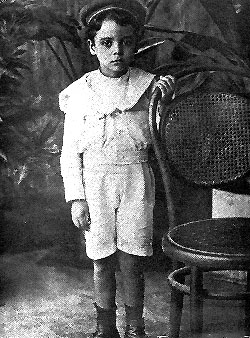
 Betancourt was born in
Betancourt was born in
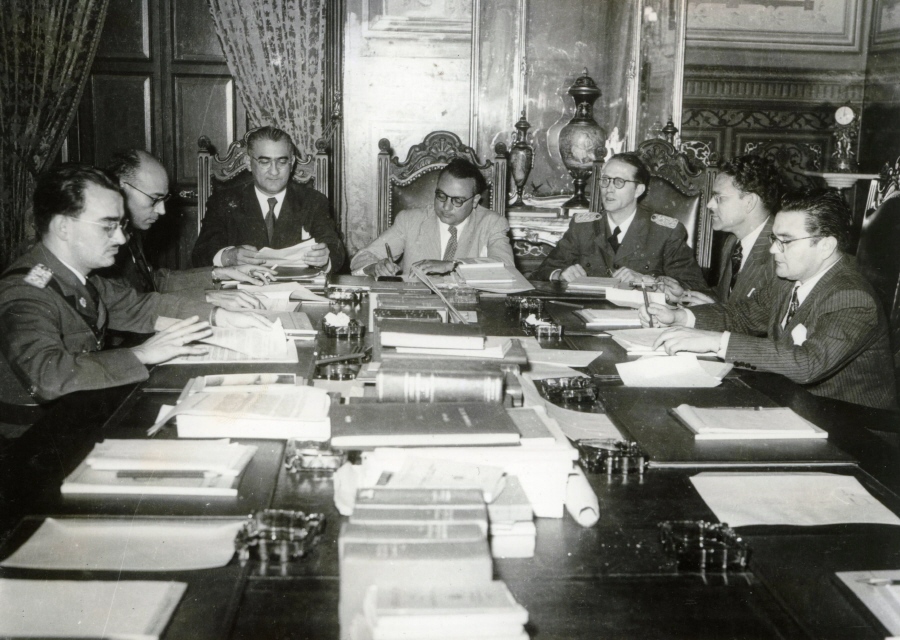 Betancourt became president in 1945 by means of a military coup d'état and, during his time in office, completed an impressive agenda. His accomplishments included the declaration of universal suffrage, the institution of social reforms, and securing half of the profits generated by foreign oil companies for Venezuela. His government worked closely with the International Refugee Organization to aid European refugees and displaced persons who could not or would not return home after World War II; his government assumed responsibility for the legal protection and resettlement of tens of thousands of refugees inside Venezuela. The refugee initiative was the subject of great controversies within his government with the winning side led by Betancourt's secretary of Agriculture, Eduardo Mendoza.
Betancourt became president in 1945 by means of a military coup d'état and, during his time in office, completed an impressive agenda. His accomplishments included the declaration of universal suffrage, the institution of social reforms, and securing half of the profits generated by foreign oil companies for Venezuela. His government worked closely with the International Refugee Organization to aid European refugees and displaced persons who could not or would not return home after World War II; his government assumed responsibility for the legal protection and resettlement of tens of thousands of refugees inside Venezuela. The refugee initiative was the subject of great controversies within his government with the winning side led by Betancourt's secretary of Agriculture, Eduardo Mendoza.
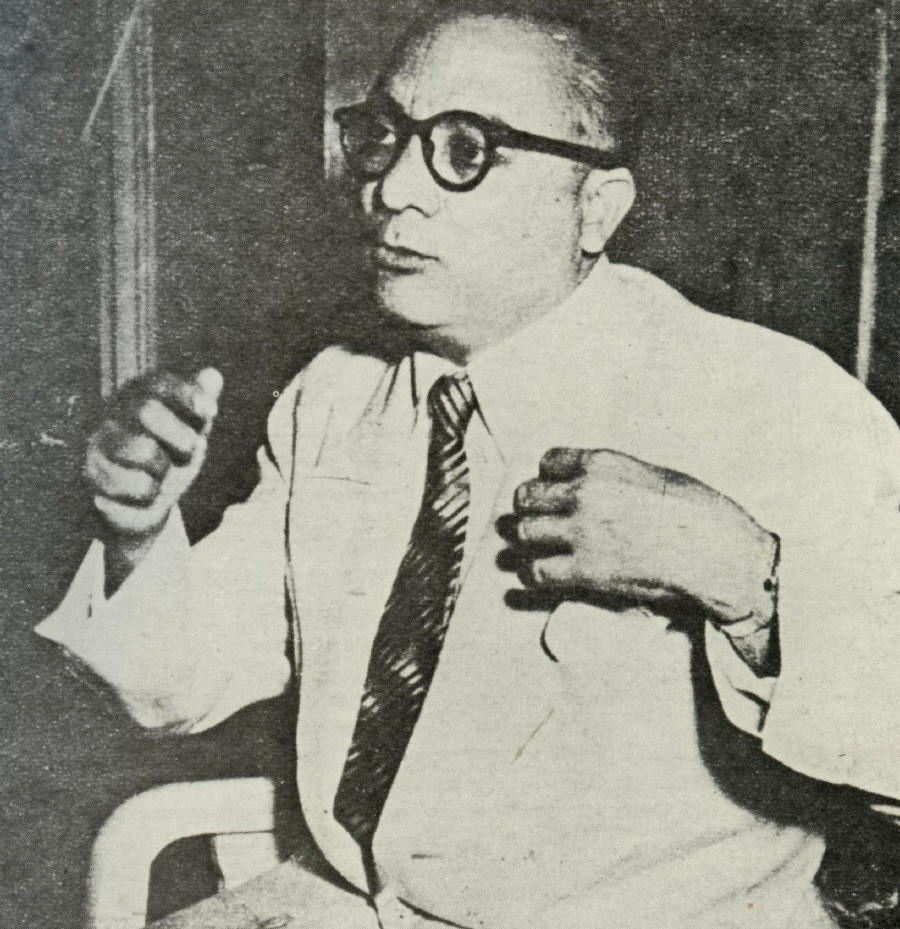 Betancourt presided over the country's first free elections, in 1947, which were won by the AD's Rómulo Gallegos. However, on 27 November 1948, Carlos Delgado Chalbaud,
Betancourt presided over the country's first free elections, in 1947, which were won by the AD's Rómulo Gallegos. However, on 27 November 1948, Carlos Delgado Chalbaud,
 A decade later, after Pérez Jiménez was ousted, Betancourt was elected president in the general election of 1958, becoming the first leader of the Punto Fijo Pact. Having inherited a well constructed country but with the need to give more education to its people, Betancourt nevertheless managed to return the state to fiscal solvency despite the rock-bottom petroleum prices throughout his presidency.
In 1960 two important institutions were created by Juan Pablo Pérez Alfonso, Betancourt's minister of Mines and Hydrocarbons: the Venezuelan Petroleum Corporation (Corporación Venezolana del Petróleo — CVP), conceived to oversee the national petroleum industry, and the Organization of the Petroleum Exporting Countries ( OPEC), the international oil cartel that Venezuela established in partnership with
A decade later, after Pérez Jiménez was ousted, Betancourt was elected president in the general election of 1958, becoming the first leader of the Punto Fijo Pact. Having inherited a well constructed country but with the need to give more education to its people, Betancourt nevertheless managed to return the state to fiscal solvency despite the rock-bottom petroleum prices throughout his presidency.
In 1960 two important institutions were created by Juan Pablo Pérez Alfonso, Betancourt's minister of Mines and Hydrocarbons: the Venezuelan Petroleum Corporation (Corporación Venezolana del Petróleo — CVP), conceived to oversee the national petroleum industry, and the Organization of the Petroleum Exporting Countries ( OPEC), the international oil cartel that Venezuela established in partnership with
 AD's land reform distributed unproductive private properties and public lands to halt the decline in agricultural production. Landowners who had their properties confiscated received generous compensation.
AD's land reform distributed unproductive private properties and public lands to halt the decline in agricultural production. Landowners who had their properties confiscated received generous compensation.
 Betancourt had denounced the dictatorship of the
Betancourt had denounced the dictatorship of the
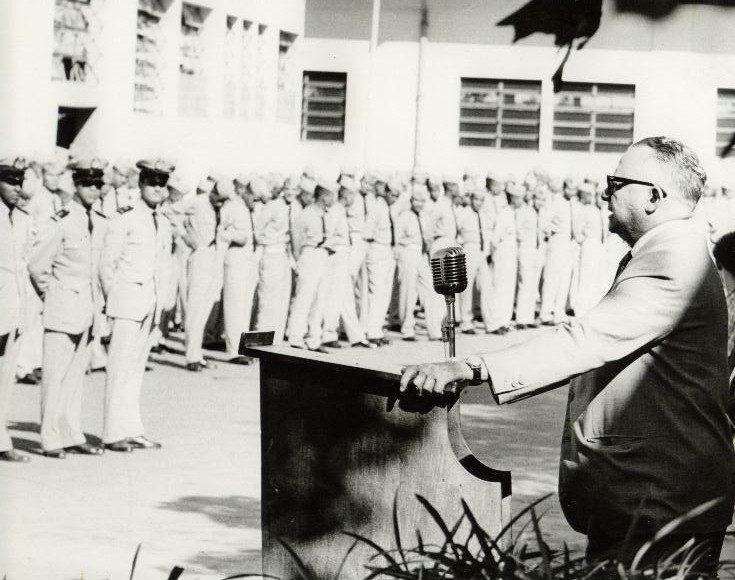 The Venezuelan president's antipathy for nondemocratic rule was reflected in the so-called Betancourt Doctrine, which denied Venezuelan diplomatic recognition to any regime, right or left, that came to power by military force. Betancourt always defended, and represented, democratic values and principles in Latin America. This put him at odds with the military strongmen who came to dominate and define political perception of the region.
During his first message to Congress as President of Venezuela, on 12 February 1959, Betancourt said:
The Venezuelan president's antipathy for nondemocratic rule was reflected in the so-called Betancourt Doctrine, which denied Venezuelan diplomatic recognition to any regime, right or left, that came to power by military force. Betancourt always defended, and represented, democratic values and principles in Latin America. This put him at odds with the military strongmen who came to dominate and define political perception of the region.
During his first message to Congress as President of Venezuela, on 12 February 1959, Betancourt said:
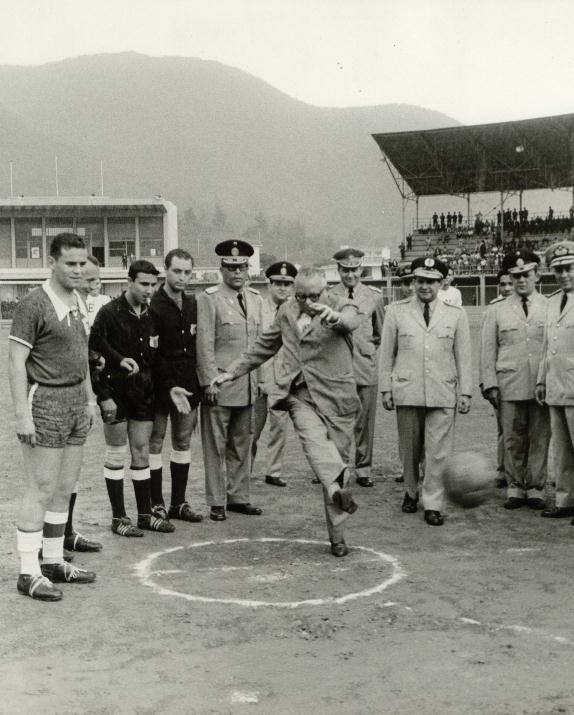 In 1964, Betancourt was awarded a lifetime seat in Venezuela's senate, due to status as a former president. His last days were dedicated to writing and to his wife Dr. Renee Hartmann. He died on 28 September 1981 in Doctors Hospital in
In 1964, Betancourt was awarded a lifetime seat in Venezuela's senate, due to status as a former president. His last days were dedicated to writing and to his wife Dr. Renee Hartmann. He died on 28 September 1981 in Doctors Hospital in
File:Carmen Valverde...jpg, Carmen Valverde
 *Cecilio Acosta (1928)
*Dos meses en las cárceles de Gómez (1928)
*En las huellas de la pezuña (1929)
*Con quién estamos y contra quién estamos (1932)
*Una República en venta (1932)
*Problemas venezolanos (1940)
*Un reportaje y una conferencia (1941)
*El caso de Venezuela y el destino de la democracia en América (1949)
*Escuelas y despensa, los dos pivotes de la reforma educacional (1951)
*Campos de concentración para los venezolanos y millones de dólares para las compañias petroleras (1952)
*Venezuela, factoría petrolera (1954)
*Venezuela: política y petróleo (1956)
*Posición y Doctrina (1958)
*Venezuela rinde cuentas (1962)
*Posibilidades y obstáculos de la Revolución Democrática (1965)
*Golpes de estado y gobiernos de fuerza en América Latina; la dramática experiencia dominicana (1966)
*Latin America: its problems and possibilities (1966)
*Hacia una América Latina democrática e integrada (1967)
*Venezuela dueña de su petróleo (1975)
*José Alberto Velandia: ejemplo para las nuevas generaciones de Venezuela (1975)
*El Petróleo de Venezuela (1976)
*Acción Democrática, un partido para hacer historia (1976)
*El 18 de octubre de 1945. Génesis y realizaciones de una revolución democrática (1979)
*Cecilio Acosta (1928)
*Dos meses en las cárceles de Gómez (1928)
*En las huellas de la pezuña (1929)
*Con quién estamos y contra quién estamos (1932)
*Una República en venta (1932)
*Problemas venezolanos (1940)
*Un reportaje y una conferencia (1941)
*El caso de Venezuela y el destino de la democracia en América (1949)
*Escuelas y despensa, los dos pivotes de la reforma educacional (1951)
*Campos de concentración para los venezolanos y millones de dólares para las compañias petroleras (1952)
*Venezuela, factoría petrolera (1954)
*Venezuela: política y petróleo (1956)
*Posición y Doctrina (1958)
*Venezuela rinde cuentas (1962)
*Posibilidades y obstáculos de la Revolución Democrática (1965)
*Golpes de estado y gobiernos de fuerza en América Latina; la dramática experiencia dominicana (1966)
*Latin America: its problems and possibilities (1966)
*Hacia una América Latina democrática e integrada (1967)
*Venezuela dueña de su petróleo (1975)
*José Alberto Velandia: ejemplo para las nuevas generaciones de Venezuela (1975)
*El Petróleo de Venezuela (1976)
*Acción Democrática, un partido para hacer historia (1976)
*El 18 de octubre de 1945. Génesis y realizaciones de una revolución democrática (1979)
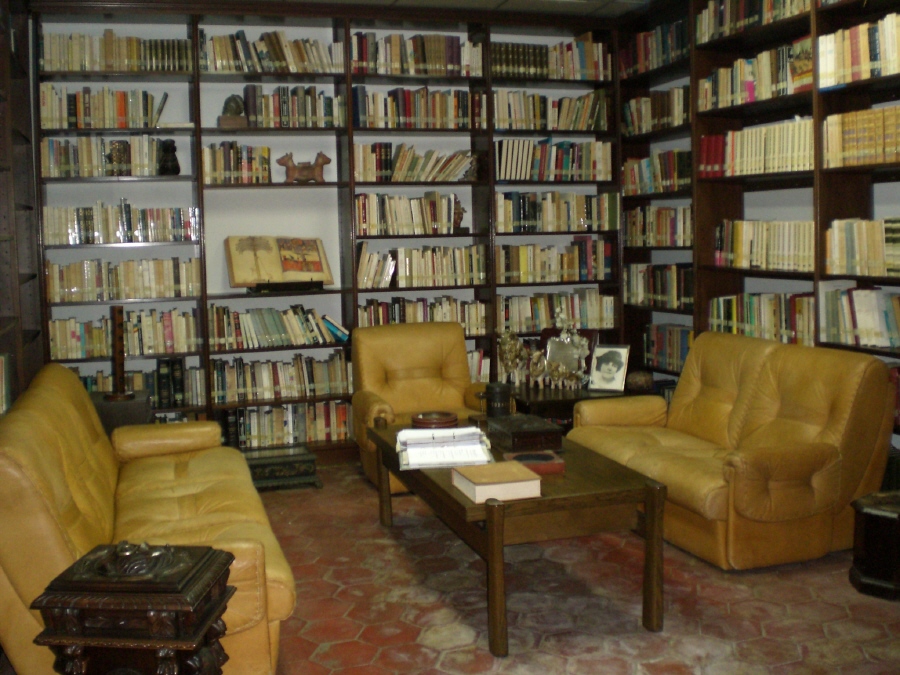 *''Venezuela: Oil & Politics''; 1978; by Rómulo Betancourt;
*''Rómulo Betancourt''; 1977; by Manuel Caballero
*''Rómulo en Berna''; 1978; by Luis González Herrera
*''Rómulo Betancourt en la historia de Venezuela del siglo XX''; 1980; by Ramón J. Velásquez, J.F. Sucre Figarella, Blas Bruni Celli
*''Rómulo Betancourt and the Transformation of Venezuela''; 1981; by Robert J. Alexander;
*''Rómulo y Yo''; 1984; by Renée Hartmann;
*''Rómulo''; 1984; by Sanin
*''Rómulo Betancourt, Político sin ocaso''; 1988; compilation book
*''Rómulo Betancourt, Político de Nación''; 2004; by Manuel Caballero;
*''Rómulo Betancourt''; 2005; by María Teresa Romero;
*''Mi Abuelo Rómulo''; 2013; by Alvaro Pérez Betancourt and Claudia González Gamboa;
*''Venezuela: Oil & Politics''; 1978; by Rómulo Betancourt;
*''Rómulo Betancourt''; 1977; by Manuel Caballero
*''Rómulo en Berna''; 1978; by Luis González Herrera
*''Rómulo Betancourt en la historia de Venezuela del siglo XX''; 1980; by Ramón J. Velásquez, J.F. Sucre Figarella, Blas Bruni Celli
*''Rómulo Betancourt and the Transformation of Venezuela''; 1981; by Robert J. Alexander;
*''Rómulo y Yo''; 1984; by Renée Hartmann;
*''Rómulo''; 1984; by Sanin
*''Rómulo Betancourt, Político sin ocaso''; 1988; compilation book
*''Rómulo Betancourt, Político de Nación''; 2004; by Manuel Caballero;
*''Rómulo Betancourt''; 2005; by María Teresa Romero;
*''Mi Abuelo Rómulo''; 2013; by Alvaro Pérez Betancourt and Claudia González Gamboa;
Biography at Efemeridesvenezolanas.com
Betancourt Foundation – Official Page
{{DEFAULTSORT:Betancourt, Romulo 1908 births 1981 deaths Venezuelan anti-communists Venezuelan people of Canarian descent Leaders who took power by coup Venezuelan democracy activists Venezuelan journalists Presidents of Venezuela Venezuelan life senators Venezuelan exiles Exiled politicians Generation of 1928 People from Guatire Democratic Action (Venezuela) politicians Prisoners and detainees of Venezuela 20th-century journalists
Venezuela
Venezuela (; ), officially the Bolivarian Republic of Venezuela ( es, link=no, República Bolivariana de Venezuela), is a country on the northern coast of South America, consisting of a continental landmass and many islands and islets in th ...
's dominant political party in the 20th century.
Betancourt, one of Venezuela's most important political figures, led a tumultuous career in Latin American
Latin Americans ( es, Latinoamericanos; pt, Latino-americanos; ) are the citizens of Latin American countries (or people with cultural, ancestral or national origins in Latin America). Latin American countries and their diasporas are multi-eth ...
politics. Periods of exile brought Betancourt in contact with various Latin American countries as well as the United States
The United States of America (U.S.A. or USA), commonly known as the United States (U.S. or US) or America, is a country primarily located in North America. It consists of 50 states, a federal district, five major unincorporated territori ...
, securing his legacy as one of the most prominent international leaders to emerge from 20th-century Latin America. Scholars credit Betancourt as the Founding Father
The following list of national founding figures is a record, by country, of people who were credited with establishing a state. National founders are typically those who played an influential role in setting up the systems of governance, (i.e. ...
of modern democratic Venezuela.
Early years

 Betancourt was born in
Betancourt was born in Guatire
Guatire is a city in Miranda (state), Miranda, Venezuela. In 2006, its population has been estimated at 200,417. Today, Guatire has virtually merged with its neighbour, Guarenas forming the Guarenas-Guatire conurbation.
Located in Miranda Stat ...
, a town near Caracas. His parents were Luis Betancourt Bello (of Canary origins) and Virginia Bello Milano. He attended a private school in Guatire, followed by high school at the ''Liceo Caracas'' in Caracas. He studied law at the Central University of Venezuela.
As a young man he was expelled from Venezuela for agitation and moved to Costa Rica where he founded, and led, a number of Communist student groups. In the early 1930s, while in Costa Rica, he became one of the main militants of that country's Communist Party
A communist party is a political party that seeks to realize the socio-economic goals of communism. The term ''communist party'' was popularized by the title of ''The Manifesto of the Communist Party'' (1848) by Karl Marx and Friedrich Engels. ...
at the young age of 22. In 1937, after resigning from the Communist Party and returning to Venezuela, he founded the Partido Democrático Nacional, which became an official political party in 1941 as Acción Democrática (AD).
Colombian leader Jorge Eliécer Gaitán claimed Betancourt had "offered him arms and money to launch a revolution in Colombia" which was part of Betancourt's alleged plan to build a solid phalanx of left-wing regimes in the Caribbean.
It was alleged by Azula Barrera and Colombian President Mariano Ospina Pérez
Luis Mariano Ospina Pérez (24 November 1891 – 14 April 1976), commonly known as Mariano Ospina Pérez, was a Colombian politician and a member of the Colombian Conservative Party. He served as the 17th President of Colombia between 194 ...
that Betancourt had supported the armed rising at the 1948 Inter-American Conference (Bogotazo
El Bogotazo (from "Bogotá" and the ''-azo'' suffix of violent augmentation) refers to the massive riots that followed the assassination in Bogotá, Colombia of Liberal leader and presidential candidate Jorge Eliécer Gaitán on 9 April 194 ...
) that left more than a thousand people dead, among these the political assassination of Jorge Eliécer Gaitán.
First term as president
Reform of the oil industry
In 1941, before AD's entry into policymaking, Venezuela received 85,279,158 bolívars from oil taxes, out of a total oil value of 691,093,935 bolivars. Before Betancourt's changes in the taxing system, the state of Venezuela was making only a fraction of what foreign oil companies were making in profit. President Betancourt had overthrown the Isaías Medina Angarita government which enacted a law to tax oil companies up to 60%, and reserved for the government the right to raise more taxes as needed. Betancourt changed the law to "Fifty to Fifty". One of Betancourt's original objectives was the nationalization of the country's oil industry. Mexico had nationalized its oil industry in 1938, and because its economy was more diversified than Venezuela's, there was little to no backlash. Though oil nationalization became one of AD's main objectives, Venezuela's economy was not stable enough to handle potential boycotts by foreign oil companies and would have left nation fiscally vulnerable. Rationalizing the complications of nationalization at the time, Betancourt's government raised taxes on oil production instead accomplishing the same goal: Venezuela's oil riches to benefit Venezuelans. In the late 1940s Venezuela was producing close to annually and as production climbed, the tax followed. Venezuela was the Allies' top oil supplier during the wars occurring in the European continent. Betancourt identified this potential to play an important historical role, using the knowledge to his nation's advantage transforming Venezuela into a global player. Germany then lacked reliable access to oil limiting troop movements. Some historians identify this vulnerability a deciding factor in Hitler's defeat. Venezuelan oil played a key role. According to Betancourt, a spike in taxes was just as effective as nationalizing the oil industry, "Tax income was increased from then to such a degree that nationalization was unnecessary to obtain maximum economic benefits for the people of the country". Oil companies were forced to cede to the demands of labor unions and no longer entitled to make larger profits than the Venezuelan government. As a result, Betancourt's government generally had full support of the labor unions as the administration openly encouraged workers to organize. In 1946, 500 labor unions were created. Another notable achievement of Betancourt's first administration include the termination of the concession policy, the initial development of refineries within Venezuela, and tremendous improvement in worker conditions and pay. Juan Pablo Pérez Alfonso served as Minister of Development in Betancourt's first term.Government Junta cabinet (1945–1948)
Third exile
Marcos Pérez Jiménez
Marcos Evangelista Pérez Jiménez (25 April 1914 – 20 September 2001) was a Venezuelan military and general officer of the Army of Venezuela and the dictator of Venezuela from 1950 to 1958, ruling as member of the military junta from 19 ...
and Luis Felipe Llovera Páez launched the 1948 Venezuelan coup d'état and overthrew Gallegos after just ten months in office. Betancourt went into exile in New York City. In exile he planned a political return sustained on democratic principles and open elections legitimizing his national leadership role. His forward vision and strategy was successful and Betancourt was elected president by his own people upon returning to Venezuela. He had been determined to expose to the world the political problems and dictatorships that plagued the country through most of its modern history – a risky proposition.
"Betancourt's third, and longest, period of exile was a time of enormous frustration. In the prime of his life --for roughly the decade of his forties-- he was forced into relative inactivity and obscurity. He traveled extensively, living in Cuba, Costa Rica, and Puerto Rico, and remained a leader of an opposition-in-exile to the Perez Jimenez dictatorship. And of course wrote 'Venezuela: Oil and Politics'. A beach home outside of San Juan (Puerto Rico) provided a quiet refuge for this work," wrote Franklin Tugwell in his Introduction to the 1978 English publication of Betancourt's book.
"The preparation of this book has been as hectic as the life of the author. I wrote it first between the years 1937–39 while I was underground hiding from the police. It could not be published then because no Venezuelan publisher would dare risk printing a book written by one who was in such compromising position. The only typewritten copy was among my personal papers and it disappeared with them when a military patrol plundered the house I was living in when the constitutional government was overthrown on 24 November 1948. Thus most of the material from the first draft was lost.
"I believe that 'the dead command,' although not in the sense that reactionaries have traditionally given the phrase. When they die they give the command for an ideal of human excellence, obliging those who survive to finish their work," wrote Rómulo Betancourt in the Prologue to the first edition of "Venezuela: Oil and Politics".
The book published in Mexico City by Editorial Fondo de Cultura Económica in 1956 was prohibited from circulating in Venezuela. Despite being effectively censored, Betancourt persisted.
Second term as president
 A decade later, after Pérez Jiménez was ousted, Betancourt was elected president in the general election of 1958, becoming the first leader of the Punto Fijo Pact. Having inherited a well constructed country but with the need to give more education to its people, Betancourt nevertheless managed to return the state to fiscal solvency despite the rock-bottom petroleum prices throughout his presidency.
In 1960 two important institutions were created by Juan Pablo Pérez Alfonso, Betancourt's minister of Mines and Hydrocarbons: the Venezuelan Petroleum Corporation (Corporación Venezolana del Petróleo — CVP), conceived to oversee the national petroleum industry, and the Organization of the Petroleum Exporting Countries ( OPEC), the international oil cartel that Venezuela established in partnership with
A decade later, after Pérez Jiménez was ousted, Betancourt was elected president in the general election of 1958, becoming the first leader of the Punto Fijo Pact. Having inherited a well constructed country but with the need to give more education to its people, Betancourt nevertheless managed to return the state to fiscal solvency despite the rock-bottom petroleum prices throughout his presidency.
In 1960 two important institutions were created by Juan Pablo Pérez Alfonso, Betancourt's minister of Mines and Hydrocarbons: the Venezuelan Petroleum Corporation (Corporación Venezolana del Petróleo — CVP), conceived to oversee the national petroleum industry, and the Organization of the Petroleum Exporting Countries ( OPEC), the international oil cartel that Venezuela established in partnership with Kuwait
Kuwait (; ar, الكويت ', or ), officially the State of Kuwait ( ar, دولة الكويت '), is a country in Western Asia. It is situated in the northern edge of Eastern Arabia at the tip of the Persian Gulf, bordering Iraq to the nort ...
, Saudi Arabia
Saudi Arabia, officially the Kingdom of Saudi Arabia (KSA), is a country in Western Asia. It covers the bulk of the Arabian Peninsula, and has a land area of about , making it the fifth-largest country in Asia, the second-largest in the A ...
, Iraq
Iraq,; ku, عێراق, translit=Êraq officially the Republic of Iraq, '; ku, کۆماری عێراق, translit=Komarî Êraq is a country in Western Asia. It is bordered by Turkey to the north, Iran to the east, the Persian Gulf and K ...
, and Iran
Iran, officially the Islamic Republic of Iran, and also called Persia, is a country located in Western Asia. It is bordered by Iraq and Turkey to the west, by Azerbaijan and Armenia to the northwest, by the Caspian Sea and Turkmeni ...
. Considered a radical revolutionary idea at the time by its opponents, but essential to Venezuela's independence and fiscal solvency by a visionary nationalistic Betancourt.
At an annual oil convention in Cairo, Venezuela's envoy, fluent in Arabic, convinced oil producing Middle Eastern countries to sign a secret agreement that promoted unity and control of their own national oil resources; under the noses of the British and American corporations that dominated the oil industry globally and had funded the event. Planting the seed for OPEC that was founded in September 1960 at Baghdad
Baghdad (; ar, بَغْدَاد , ) is the capital of Iraq and the second-largest city in the Arab world after Cairo. It is located on the Tigris near the ruins of the ancient city of Babylon and the Sassanid Persian capital of Ctesiphon. I ...
, Iraq. This movement was triggered by a 1960 law instituted by American President Dwight Eisenhower that forced quotas for Venezuelan oil and favored Canada and Mexico's oil industries. Eisenhower cited national security, land access to energy supplies, at times of war. Betancourt reacted seeking an alliance with oil producers of Middle Orient and North Africa as a pre-emptive strategy to protect the continuous autonomy and profitability of Venezuela's oil, establishing a strong link between the South American nation and the OPEC countries that survives to this day.
On a scenario of suspended economic guarantees, special situation derived from the Castro-communist armed insurrection, Betancourt adopted the CEPAL model of substitution of imports in order to achieve a fast track to development through industrialization that succeeds in replacing imported goods with locally produced goods. The government strategy include tax exceptions to attract capital investment and terrains at low cost to facilitate foreign suppliers to build plants for the assembly or packaging of finished products, closing the economy to trade through excessive tax to similar imported goods, import quotas to reduce foreign competition or other quantitative restrictions that prohibited imports. In addition, the Central Bank overestimated the Bolivar to cut down prices of imported inputs and promote export-oriented growth. Large road-building, and electrical power programs as the construction of Guri Dam
The Simón Bolívar Hydroelectric Plant, also Guri Dam ( es, Central Hidroeléctrica Simón Bolívar or ''Represa de Guri''), previously known as the Raúl Leoni Hydroelectric Plant, is a concrete gravity and embankment dam in Bolívar State, Ven ...
Phase I were carried out, transforming Venezuela into a modernized Latin American nation.
Agrarian reform
 AD's land reform distributed unproductive private properties and public lands to halt the decline in agricultural production. Landowners who had their properties confiscated received generous compensation.
AD's land reform distributed unproductive private properties and public lands to halt the decline in agricultural production. Landowners who had their properties confiscated received generous compensation.
FALN guerrilla group
Betancourt also faced determined opposition from extremists and rebellious army units, yet he continued to push for economic and educational reform. A fraction split from the AD and formed the Revolutionary Left Movement (MIR). When leftists were involved in unsuccessful revolts at Barcelona ('' El Barcelonazo'') in 1961 and in navy bases in 1962 ('' El Carupanazo'', Carúpano, and '' El Porteñazo'', Puerto Cabello), Betancourt suspended civil liberties. Elements of the left parties then formed the Armed Forces for National Liberation (FALN), a communist guerrilla army to fight him. This drove the leftists underground, where they engaged in rural and urban guerrilla activities, including sabotaging oil pipelines, bombing aSears Roebuck
Sears, Roebuck and Co. ( ), commonly known as Sears, is an American chain of department stores founded in 1892 by Richard Warren Sears and Alvah Curtis Roebuck and reincorporated in 1906 by Richard Sears and Julius Rosenwald, with what began a ...
warehouse, Alfredo Di Stefano kidnapping, and bombing the United States Embassy in Caracas. FALN failed to rally the rural poor and to disrupt the December 1963 elections.
After numerous attacks, he finally arrested the MIR and Communist Party of Venezuela
The Communist Party of Venezuela ( es, Partido Comunista de Venezuela, PCV) is a communist party and the oldest continuously existing party in Venezuela. It was the main leftist political party in Venezuela from its foundation in 1931 until its ...
(PCV) members of Congress
A congress is a formal meeting of the representatives of different countries, constituent states, organizations, trade unions, political parties, or other groups. The term originated in Late Middle English to denote an encounter (meeting of ...
. It became clear that a leftist Fidel Castro had been arming the rebels, so Venezuela protested to the Organization of American States (OAS).
Assassination attempt
 Betancourt had denounced the dictatorship of the
Betancourt had denounced the dictatorship of the Dominican Republic
The Dominican Republic ( ; es, República Dominicana, ) is a country located on the island of Hispaniola in the Greater Antilles archipelago of the Caribbean region. It occupies the eastern five-eighths of the island, which it shares with ...
's Rafael Trujillo. In turn, Trujillo had developed an obsessive personal hatred of Betancourt and supported many plots by Venezuelan exiles to overthrow him. The Venezuelan government took its case against Trujillo to the Organization of American States, turning to diplomacy first over armed response to resolve the political conflict. That, in turn, infuriated Trujillo, who ordered his foreign agents to assassinate Betancourt in Caracas. The 24 June 1960 attempt, in which the Venezuelan president was badly burned, inflamed world public opinion against Trujillo.
Photos of a wounded but living Betancourt were distributed around the world as proof he survived the assassination attempt that killed his head of security and severely injured the driver, who later died. An incendiary car bomb, which was in a parked vehicle, was detonated as his presidential car drove by one of the main avenues of Caracas, which shocked the nation. With both burned hands wrapped in bandages, Betancourt walked out of the hospital in front of photographers. The incident elevated him in the eyes of the public opinion and helped to destroy one of his most ferocious Caribbean enemies at the same time.
Constitutional government cabinet (1959–1964)
1963 elections
Perhaps one of the greatest of Betancourt's accomplishments, however, were the successful 1963 elections. Despite threats to disrupt the process, nearly 90 percent of the electorate participated on 1 December in what was the most honest election in Venezuela to that date. 11 March 1964 was a day of pride for the people of Venezuela as for the first time the presidential sash passed from one democratically elected chief executive to another. Prior to Betancourt changing the law, all presidents in Venezuela were elected by Congress – in typical republic model. He was Venezuela's first democratically elected president to serve his full term, and was succeeded byRaúl Leoni
Raúl Leoni Otero (26 April 1905 – 5 July 1972) was the president of Venezuela from 1964 until 1969. He was a member of the Generation of 1928 and a charter member of the Acción Democrática party, and the first Labor minister of Venezuela (d ...
. It was Romulo Betancourt who established a democratic precedent for the nation that had been ruled by dictatorships for most of its history.
It was 'revolution' by popular vote, without historical reference until then; Betancourt created the political model that had survived in Venezuela for many years afterward.
Betancourt Doctrine
 The Venezuelan president's antipathy for nondemocratic rule was reflected in the so-called Betancourt Doctrine, which denied Venezuelan diplomatic recognition to any regime, right or left, that came to power by military force. Betancourt always defended, and represented, democratic values and principles in Latin America. This put him at odds with the military strongmen who came to dominate and define political perception of the region.
During his first message to Congress as President of Venezuela, on 12 February 1959, Betancourt said:
The Venezuelan president's antipathy for nondemocratic rule was reflected in the so-called Betancourt Doctrine, which denied Venezuelan diplomatic recognition to any regime, right or left, that came to power by military force. Betancourt always defended, and represented, democratic values and principles in Latin America. This put him at odds with the military strongmen who came to dominate and define political perception of the region.
During his first message to Congress as President of Venezuela, on 12 February 1959, Betancourt said:
"... Regimes disrespectful of human rights, violating their citizens´ freedom, tyrannizing them with the backing of totalitarian political police, should be submitted to a rigorous sanitary cordon and eradicated, through collective pacification, from the Inter-American juridical community"The Daily Journal, 16 May 1977. (Rómulo Betancourt, The) "Return of the Warrior"It was during the tense Cuban Missile Crisis, between the United States and Cuba, the relationship between President Kennedy and President Betancourt became closer than ever. Establishing a direct phone link between the White House and Miraflores (Presidential Palace) since the Venezuelan president had ample experience on dealing, defeating and surviving, actions of Caribbean regimes. These conversations between both presidents were translated by Betancourt's only child, Virginia Betancourt Valverde, who served as interpreter and confidant to her father. Later president
Rafael Caldera
Rafael Antonio Caldera Rodríguez ( (); 24 January 1916 – 24 December 2009), twice elected the president of Venezuela, served for two five-year terms (1969–1974 and 1994–1999), becoming the longest serving democratically elected leade ...
distanced himself from the doctrine, which he thought had
served to isolate Venezuela in the world. A thesis that continues to be debated among academics and intellectuals who see in Betancourt not an isolationist but a courageous defender of democratic principles in the midst of adversity and ferreous enemies.
Later life
New York City
New York, often called New York City or NYC, is the most populous city in the United States. With a 2020 population of 8,804,190 distributed over , New York City is also the most densely populated major city in the Un ...
. On his death US President Ronald Reagan made the following statement:
:
Personal life
Betancourt was married to Carmen Valverde, who served asFirst Lady of Venezuela
First Lady of Venezuela (Spanish: ''Primera Dama de Venezuela'') is the unofficial title traditionally held by the wife of the president of Venezuela. The current office of the first lady is disputed.
List of first ladies
Non-spouse first ladi ...
from 1945 to 1948,, and 1959–1964. Virginia Betancourt Valverde was the Betancourt's only child. Divorced he married Dr. Renee Hartmann.
Rómulo Betancourt was a very close friend of the governor of Puerto Rico, Luis Muñoz Marín
José Luis Alberto Muñoz Marín (February 18, 1898April 30, 1980) was a Puerto Rican journalist, politician, statesman and was the first elected governor of Puerto Rico, regarded as the "Architect of the Puerto Rico Commonwealth."
In 1948 he ...
, visiting the island often and frequently exchanging political views with him, viewing him as a political advisor on democracy. Although they disagreed on certain issues they remained faithful friends. On one occasion in 1963, he refused to attend the inauguration of Juan Bosch as president of the Dominican Republic if Bosch did not extend an invitation to Muñoz Marín, who had provided a safe haven for Bosch and various members of his political party in Puerto Rico. Betancourt attended the funeral of his friend in 1980.In popular culture
The documentary film '' CAP 2 Intentos'' (''English: CAP 2 Attempts''), directed by , focuses on Betancourt's presidency between 1959 and 1964, after dictatorMarcos Pérez Jiménez
Marcos Evangelista Pérez Jiménez (25 April 1914 – 20 September 2001) was a Venezuelan military and general officer of the Army of Venezuela and the dictator of Venezuela from 1950 to 1958, ruling as member of the military junta from 19 ...
was deposed.
Bibliography
Books
 *''Venezuela: Oil & Politics''; 1978; by Rómulo Betancourt;
*''Rómulo Betancourt''; 1977; by Manuel Caballero
*''Rómulo en Berna''; 1978; by Luis González Herrera
*''Rómulo Betancourt en la historia de Venezuela del siglo XX''; 1980; by Ramón J. Velásquez, J.F. Sucre Figarella, Blas Bruni Celli
*''Rómulo Betancourt and the Transformation of Venezuela''; 1981; by Robert J. Alexander;
*''Rómulo y Yo''; 1984; by Renée Hartmann;
*''Rómulo''; 1984; by Sanin
*''Rómulo Betancourt, Político sin ocaso''; 1988; compilation book
*''Rómulo Betancourt, Político de Nación''; 2004; by Manuel Caballero;
*''Rómulo Betancourt''; 2005; by María Teresa Romero;
*''Mi Abuelo Rómulo''; 2013; by Alvaro Pérez Betancourt and Claudia González Gamboa;
*''Venezuela: Oil & Politics''; 1978; by Rómulo Betancourt;
*''Rómulo Betancourt''; 1977; by Manuel Caballero
*''Rómulo en Berna''; 1978; by Luis González Herrera
*''Rómulo Betancourt en la historia de Venezuela del siglo XX''; 1980; by Ramón J. Velásquez, J.F. Sucre Figarella, Blas Bruni Celli
*''Rómulo Betancourt and the Transformation of Venezuela''; 1981; by Robert J. Alexander;
*''Rómulo y Yo''; 1984; by Renée Hartmann;
*''Rómulo''; 1984; by Sanin
*''Rómulo Betancourt, Político sin ocaso''; 1988; compilation book
*''Rómulo Betancourt, Político de Nación''; 2004; by Manuel Caballero;
*''Rómulo Betancourt''; 2005; by María Teresa Romero;
*''Mi Abuelo Rómulo''; 2013; by Alvaro Pérez Betancourt and Claudia González Gamboa;
See also
* Presidents of Venezuela * List of VenezuelansReferences
Biography at Efemeridesvenezolanas.com
External links
Betancourt Foundation – Official Page
{{DEFAULTSORT:Betancourt, Romulo 1908 births 1981 deaths Venezuelan anti-communists Venezuelan people of Canarian descent Leaders who took power by coup Venezuelan democracy activists Venezuelan journalists Presidents of Venezuela Venezuelan life senators Venezuelan exiles Exiled politicians Generation of 1928 People from Guatire Democratic Action (Venezuela) politicians Prisoners and detainees of Venezuela 20th-century journalists